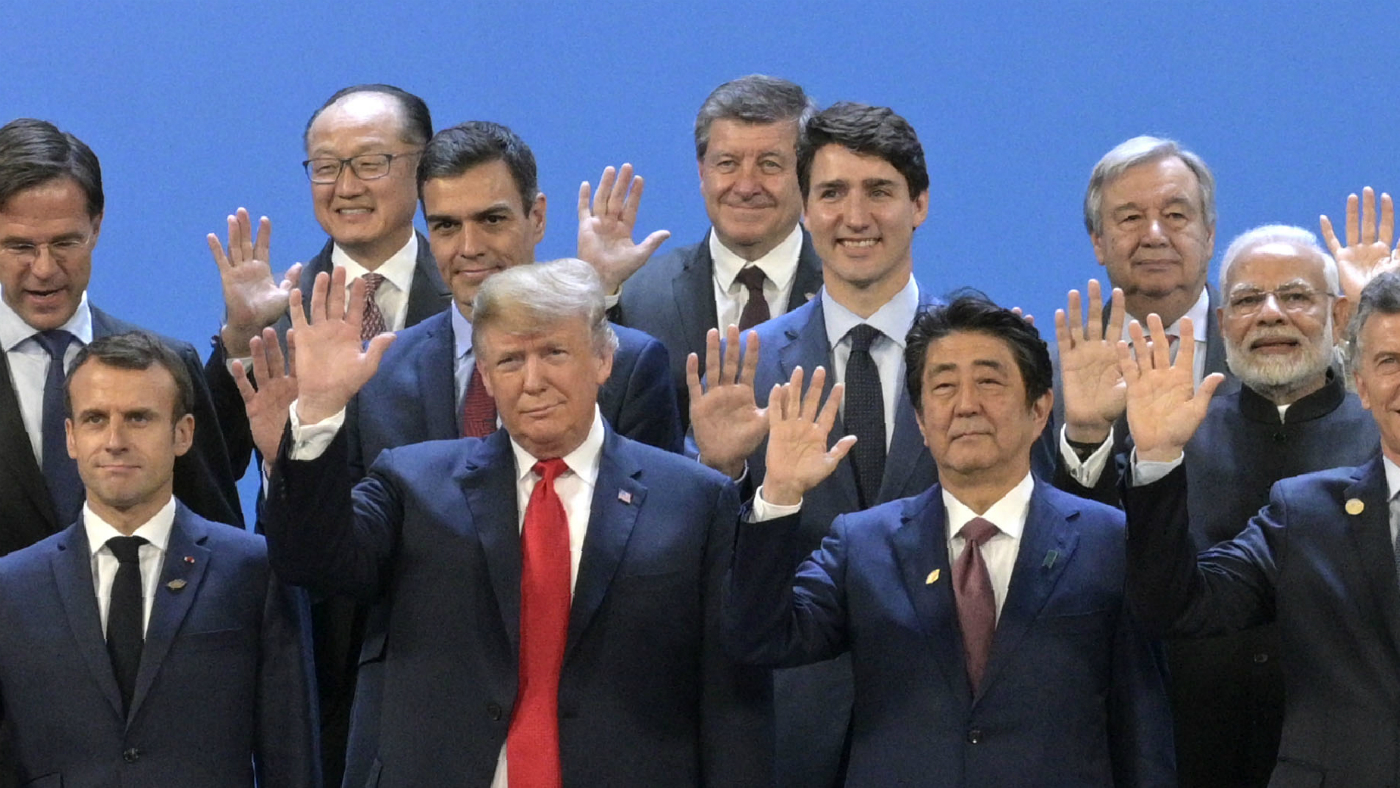G20 summit: what’s on the agenda?
Women’s empowerment and the environment are up for discussion - but China blocks Hong Kong talks

A free daily email with the biggest news stories of the day – and the best features from TheWeek.com
You are now subscribed
Your newsletter sign-up was successful
Leaders representing the Group of 20 (G20) nations are gathering in Osaka this week to discuss a range of issues affecting the international community, from the digital economy to ocean pollution.
Heightened trade tensions between the world’s two largest economies - the US and China - are likely to dominate proceedings, with one member of China’s trade negotiation team insisting that both Beijing and Washington “will need to compromise if they are to reach a trade deal when presidents Xi Jinping and Donald Trump meet” in Japan.
Zhang Jun, China’s assistant minister of foreign affairs, acknowledged that “unilateralism and protectionism have damaged global growth... undermined global value chains and dampened market sentiment”, but emphasised that “China will work with others at the G20 to firmly uphold multilateralism and an open, rule-based global trading order”.
The Week
Escape your echo chamber. Get the facts behind the news, plus analysis from multiple perspectives.

Sign up for The Week's Free Newsletters
From our morning news briefing to a weekly Good News Newsletter, get the best of The Week delivered directly to your inbox.
From our morning news briefing to a weekly Good News Newsletter, get the best of The Week delivered directly to your inbox.
Here’s what to watch out for at the G20 this week:
What is on the agenda?
Free trade
Shinzo Abe, the prime minister of Japan and de facto host of the summit, wrote this week in Project Syndicate that the “first agenda item concerns what I believe is the most important challenge of our times: working to maintain and ultimately strengthen the international order for free and fair trade”.
“For Asia’s leaders, this means forging the RCEP, or the Regional Comprehensive Economic Partnership, an advanced free-trade agreement between the ten members of the Association of Southeast Asian Nations (ASEAN) and the six Indo-Pacific states (Australia, China, India, Japan, South Korea, and New Zealand),” he said.
A free daily email with the biggest news stories of the day – and the best features from TheWeek.com
It seems likely that Abe is focusing on free trade in an attempt to prepare the summit for the scheduled meeting between presidents Trump and Xi, whose countries have been at loggerheads in a relentless tariff war in recent months.
Digital economy
The digital economy was a major talking point during the G20 Ministerial Symposium in early June, which brought together finance ministers of the member states.
The Hindu reports that on 9 June, the respective ministers of Japan, US, China, France and the UK announced that they “want digital giants such as Amazon, Google and Facebook to be taxed based on their revenue and number of users in every market where they operate”, and “called for the creation of a digital tax for multinational technology companies”.
Abe hopes to pick up the discussion in Osaka, saying that digitalisation of the economy “has enabled unique and unprecedented business models”, although he acknowledges that it has “also brought new challenges, such as double non-taxation for multinational companies”.
Japanese Finance Minister Taro Aso said G20 leaders would “work together to seek a consensus-based solution to address the impacts of digitalization on the international tax system”, highlighting “the public frustration surrounding the lower effective tax rates faced by some digital companies in particular”.
Women’s empowerment
According to the G20 website, discussions centred around “women’s empowerment” will also take place at the summit.
Empowering girls and women is “essential for achieving sustainable and inclusive economic growth”, and the leaders will discuss the “implementation of G20 commitments including those related to women’s labour participation, enhancing support for girls’ and women’s education including STEM (science, technology, engineering and maths) area and engagement with women business leaders and entrepreneurs”, says the site.
The talks will also allow countries to update the world on their progress in regard to the “25 by 25” pledge made at the 2014 G20 summit in the Australian city of Brisbane - a scheme intended to reduce the gender gap in labour force participation by 25% by 2025.
The environment
Perhaps the most significant agenda point is Japan’s aim to lead talks on the reduction of plastic waste in the oceans.
Abe says he wants his country to lead the world in reducing marine plastic waste, including developing biodegradables and other innovations, Reuters reports. But the news site cites two anonymous sources who say that the summit “won’t yield an agreement on targets or concrete steps”.
Instead, the sources say, a “more likely outcome is for G20 environment ministers” to “propose ways to enact a vaguely worded ‘action plan’ on marine plastic waste”.
What isn’t on the agenda?
Hong Kong
China’s Assistant Minister of Foreign Affairs Zhang Jun said this week that Beijing will shut down any discussions concerning Hong Kong, where civil unrest has erupted over a controversial new extradition law.
This month, millions of people have demonstrated on the streets of Hong Kong against a bill that would allow people to be extradited to the Chinese mainland to face trial in state-controlled courts.
“We will not allow G20 to discuss the Hong Kong issue,” Zhang said. “Hong Kong is China’s special administrative region. Hong Kong matters are purely an internal affair to China. No foreign country has a right to interfere.
“No matter at what venue, using any method, we will not permit any country or person to interfere in China’s internal affairs.”